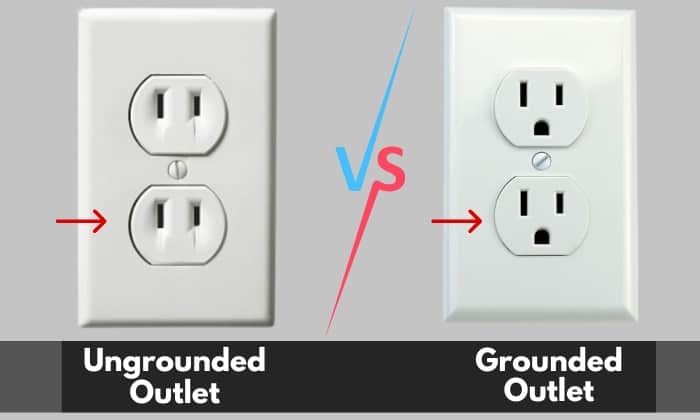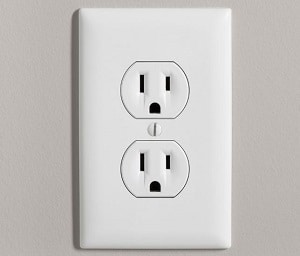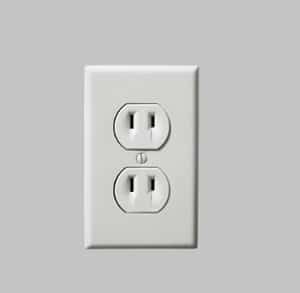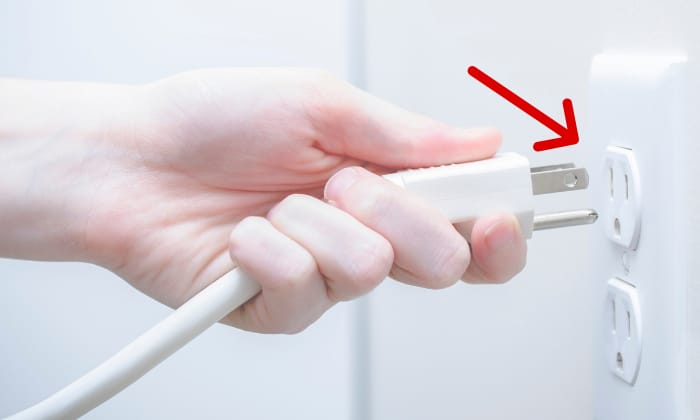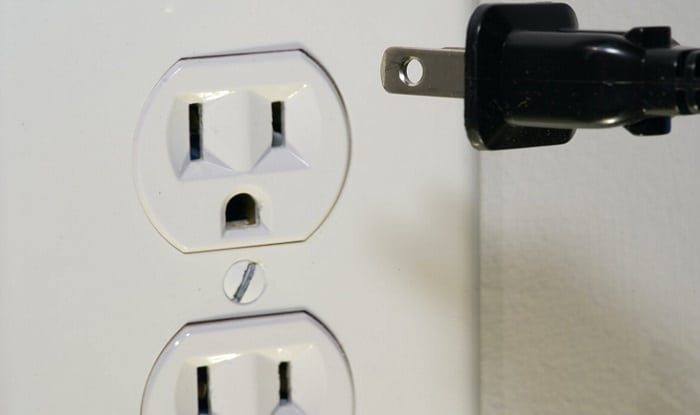Most homes built in the 1950s had a two-slot receptacle as a standard outlet. However, this practice changed after the 1962 NEC standard release, which required all circuits, particularly outlets, to have a grounded connection.
As a result, the old two-slot outlet now includes a third slot for grounding.
For a better understanding of grounded vs ungrounded outlet, see the information below, which explains their differences.
| Ungrounded outlets | Grounded outlets | |
| Appearance | 2 slots for 120V and 3 slots for 240V | 3 slots for 120V and 4 slots for 240V |
| Safety | No grounding or electrical protection | Prevent fires and other accidents with grounded connection |
Table of Contents
Grounded vs Ungrounded Wire Outlet
1. What is a Grounded Outlet?
A grounded outlet is an electrical fixture that the NEC has standardized since 1962. This item has an additional ground connection, which is significantly useful in terms of the circuit’s safety.
Most of the time, a 120v grounded outlet looks like a face emoji with two rectangular slits for hot and neutral wires above a semi-circle slot below the ground. Meanwhile, a 240v grounded outlet has two vertical slits for two hot wires, an L shape slot for neutral, and a semi-circle slot for the ground.
Similar to a grounded outlet, a grounded plug also provides a high level of protection, as long as you insert it into a 3-prong receptacle. Any device that utilizes a ground connection is safer from electrical surges.
How Does Grounded Outlet Work?
A grounded outlet is made for security reasons, to prevent the risk of sudden electrocution or fire. In the event of an electrical fault where the neutral wire is unable to bring back the electricity to its source, it will find other ways to get out of the circuit.
If a device has a grounded power cord, the electricity will have a safe place to go to. In simple words, a grounded outlet acts as an alternative path for electricity so it doesn’t cause harm to properties or people.
This is why proper grounding on the circuit and in the electrical plug is significantly useful.
Pros
- It can prevent electrical problems that can cause a fire hazard
- It can help to prevent an electric shock
- It can reduce the possibility of devices getting damaged by unwanted surges
Cons
- Quiet costly since you need to add a ground wire connection
2. What is an Ungrounded Outlet?
Ungrounded outlets are the old standard from the late 1950s. They have two prongs without a ground for a 120V outlet or three prongs without a ground for a 240V outlet.
Compared to a circuit that has a grounded outlet surge protector, ungrounded circuits, even after applying surge protectors, cannot increase the level of protection.
Ungrounded two-prong outlets can still be found in many houses these days as NEC standards still allow this electrical connection. However, if you have a three-prong ungrounded outlet, you must pair it with GFCI protection, whether in the form of a breaker or another fixture.
This process of adding GFCI can also be done to a two-prong outlet. With this setup, you can have a much safer circuit that can prevent unnecessary electrical faults which can cause electrocution or fire.
How Does an Ungrounded Outlet Work?
Ungrounded outlets typically provide less protection than grounded ones. When an electrical fault occurs in a circuit without proper grounding, the current may flow and stack until it finds a way to go out.
In this case, electricity in devices with no grounded outlet adapter can electrocute you when you accidentally touch it.
Pros
- Low-cost installation since it doesn’t require expensive parts or additional wire
Cons
- It can increase the risk of fire
- It can be harmful to various electrical devices
- Using an ungrounded outlet increases the risk of electric shocks
Differences Between Grounded and Ungrounded Outlets
Physically, the main difference between these two is that a grounded outlet always has an additional prong or wire for the ground connection. The same is true for any device that uses a grounded vs ungrounded adapter.
Though not for the same reason, a grounded outlet vs surge protector are different in terms of providing protection. They are both useful in guarding the equipment from electrical faults. However, a surge protector needs grounding to work and is non-functional without a circuit that possesses this feature.
A grounded outlet vs GFCI works similarly, with the former being slightly more effective.
Aside from the said differences, a grounded outlet extension cord also has big differences from an ungrounded one in terms of safe usage. As a result, it is good to consider this when buying extension cords that come in any ratings.
Frequently Asked Questions
Why are Grounded Outlets Important?
A grounded power outlet is an essential component of a circuit and is extremely useful to every homeowner. It can help eliminate the possibility of electrocution for everyone currently using the electrical line. Moreover, it lowers risks of electrical fires produced by sparks from various arcing faults.
What Happens if Outlets Are Not Grounded?
Without a grounded socket outlet, the current is free to flow anywhere around the circuit. In this case, it can cause damage or electrical shocks that ruin electronics, injure anyone near the circuit, or start a spark resulting in more extensive damage.
Can You Replace an Ungrounded Outlet with a Grounded Outlet?
The best way to ground an ungrounded outlet is to rewire the circuit, but it costs a lot. Therefore, you can use two other options.
First, replace the existing outlet with a grounded one and add a ground connection from the receptacle to the load center. However, the latter step only works if the outlet box and conduit are metal.
Second, install a GFCI outlet and add a “No Equipment Ground” sticker to it.
Conclusion
Knowing the definition of and differences between grounded vs ungrounded outlet will help you determine which one is more advantageous. Furthermore, being able to spot circuits with ground protection is useful.
Always remember that protective equipment is essential for safety when it comes to electricity.
So, do not use a grounded to ungrounded adapter in an ungrounded circuit. Instead, call a professional to upgrade the circuit.
Recommended for you: Ground Fault Vs Short Circuit
Quick Comparisons:

I am Edwin Jones, in charge of designing content for Galvinpower. I aspire to use my experiences in marketing to create reliable and necessary information to help our readers. It has been fun to work with Andrew and apply his incredible knowledge to our content.

